标签:ted images default add 直接 sig string 定义 tip
android ndk-build 编译静态库libxx.a
需求场景:
目前有安卓编码好的现在的openssl的两个.a,我们需要调用openssl的函数,并把功能再封装成.a;
这样使用时,在android studio jni项目 cmake 里面,需要先引用openssl的.a再引用 上面封装的.a;
如果使用so,那么,直接在android studio jni项目的 cpp里面直接调用openssl的方法,对外提供jni java接口,打包成so即可;
先来说用ndk-build 打包 libxx.a吧,并在打包的时候引用openssl的静态库.a
1. 首先当前目录下准备好 编码好的openssl静态库,如下图示,安卓平台的
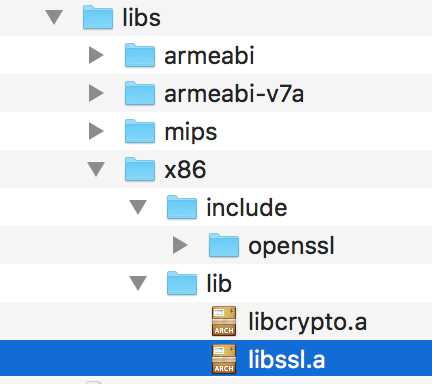
2. 测试使用的源文件,我这里在.h声明一个封装的方法 ssl_sha,并且在.c 实现里面,调用 openssl 的SHA256接口;如下
加 #ifdef __cplusplus 是为了在jni调用时,cpp里面出现未定义的错误,如下 ssl_hash.h
#ifndef ssl_hash_h #define ssl_hash_h # ifdef __cplusplus extern "C" { #endif #include <stdio.h> /* * openssl sha256 * */ int ssl_sha256(const char *in_data,int in_len,char *out_hash); # ifdef __cplusplus } # endif #endif /* ssl_hash_h */
如下 ssl_hash.c 实现文件
#include "ssl_hash.h" #include "openssl/sha.h" int ssl_sha256(const char *in_data,int in_len,char *out_hash) { if (!in_data) { return -100; } if (!SHA256((const unsigned char *)in_data, in_len, (unsigned char *)out_hash)) { return -1001; } return 1; }
同样这两文件也要放在 .mk的同一目录;
3. 开始编写 Android.mk,Application.mk, 如下示例
#Android.mk文件 LOCAL_PATH := $(call my-dir) include $(CLEAR_VARS) #编码后生成的.a的名称 LOCAL_MODULE := sslhash #要编码的源文件c或cpp LOCAL_SRC_FILES := ssl_hash.c #依赖的静态库.a,若要使用动态库使用LOCAL_SHARED_LIBRARIES .so LOCAL_STATIC_LIBRARIES := libs/${TARGET_ARCH_ABI}/lib/libssl.a libs/${TARGET_ARCH_ABI}/lib/libcrypto.a #依赖的静态库的头文件 LOCAL_C_INCLUDES := libs/${TARGET_ARCH_ABI}/include #最后生成静态库 include $(BUILD_STATIC_LIBRARY)
#Application.mk 这里测试,只编译出x86的
APP_ABI := x86
4. 所有文件都准备好之后如下图示:
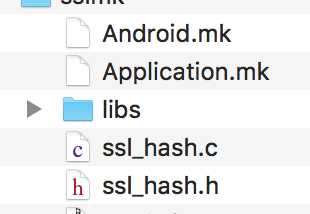
5. 调用ndk-build 开始编译
~/Library/Android/sdk/ndk-bundle/ndk-build NDK_PROJECT_PATH=./ NDK_LIBS_OUT=./ APP_BUILD_SCRIPT=./Android.mk NDK_APPLICATION_MK=./Application.mk
6. 成功之后会在当前目录下生成 obj目录,里面包含生成的 静态库libxx.a
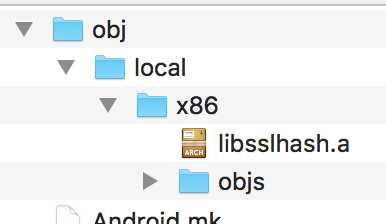
7. 编译好之后,下面需要在Android studio 中测试;用as 创建一个jni项目;
8.在工程build.gradle(Module:app) 里面添加 libs目录 (Android 视图)
externalNativeBuild { cmake { path "CMakeLists.txt" } } sourceSets { main { jniLibs.srcDirs = [‘libs‘] } }
并且在指定测试只编译 x86
externalNativeBuild { cmake { cppFlags "" abiFilters "x86" } } ndk{ abiFilters "x86" }
9. 将之前libs目录的openssl库全部copy到 工程 jnilibs目录 (Android 视图)
并把生成的libsslhash.a放到 x86/lib下
并把ssl_hash.h头文件放到x86/include下
放到哪都行,需要在cmake里面指定引用好
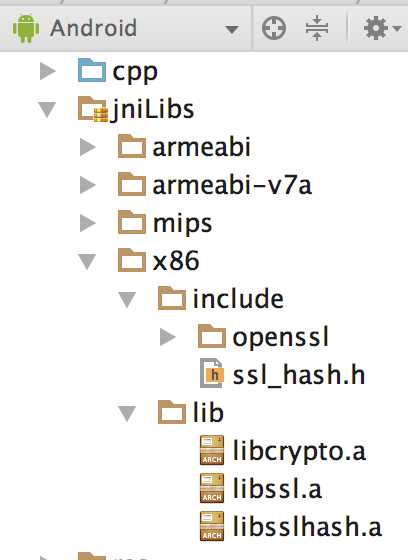
10. 打开CmakeList.txt 配置openssl静态库的引用,以及配置引用生成的libsslhash.a
如下完善的cmakelist
cmake_minimum_required(VERSION 3.4.1) set(CMAKE_CXX_FLAGS "${CMAKE_CXX_FLAGS} -std=gnu++11") #这里配置指定目录libs set(OpenSSL_DIR ${CMAKE_SOURCE_DIR}/libs) # Creates and names a library, sets it as either STATIC # or SHARED, and provides the relative paths to its source code. # You can define multiple libraries, and CMake builds them for you. # Gradle automatically packages shared libraries with your APK. #这里引用三个静态.a, ssl,sslhash,crypto add_library(crypto STATIC IMPORTED) add_library(ssl STATIC IMPORTED) add_library(sslhash STATIC IMPORTED) # 这里加载,并且找到相应的 libxxx.a set_target_properties( # Specifies the target library. crypto # Specifies the parameter you want to define. PROPERTIES IMPORTED_LOCATION # Provides the path to the library you want to import. ${OpenSSL_DIR}/${ANDROID_ABI}/lib/libcrypto.a ) set_target_properties( # Specifies the target library. ssl # Specifies the parameter you want to define. PROPERTIES IMPORTED_LOCATION # Provides the path to the library you want to import. ${OpenSSL_DIR}/${ANDROID_ABI}/lib/libssl.a ) set_target_properties( # Specifies the target library. sslhash # Specifies the parameter you want to define. PROPERTIES IMPORTED_LOCATION # Provides the path to the library you want to import. ${OpenSSL_DIR}/${ANDROID_ABI}/lib/libsslhash.a) add_library( # Sets the name of the library. native-lib # Sets the library as a shared library. SHARED # Provides a relative path to your source file(s). src/main/cpp/native-lib.cpp ) # Searches for a specified prebuilt library and stores the path as a # variable. Because CMake includes system libraries in the search path by # default, you only need to specify the name of the public NDK library # you want to add. CMake verifies that the library exists before # completing its build. find_library( # Sets the name of the path variable. log-lib # Specifies the name of the NDK library that # you want CMake to locate. log ) # Specifies libraries CMake should link to your target library. You # can link multiple libraries, such as libraries you define in this # build script, prebuilt third-party libraries, or system libraries. #这里openssl需要 zlib库,加载系统的 find_library( z-lib z ) #这里指定一下咱的头文件目录,openssl头文件,以及咱封装的ssl_hash.h头文件 include_directories( ${OpenSSL_DIR}/${ANDROID_ABI}/include ${OpenSSL_DIR}/${ANDROID_ABI}/ ) #最后一步连接,这里注意,一定要把sslhash,咱封装的这个.a放到ssl,crypto的前面,不然报错说方法未定义,可能因为sslhash引用了openssl的东西, target_link_libraries( # Specifies the target library. native-lib # Links the target library to the log library # included in the NDK. sslhash ssl crypto ${log-lib} ${z-lib})
11. 配置完成,如果编译不出问题就可以写jni调用测试了;
在 MainActitity.java里面,添加一下jni方法
public native String stringFromJNI(); //添加的测试方法 public native int sslsha(byte[] indata,int inlen,byte[] outhash);
12. 在native-lib.cpp 里面实现jni方法
#include "ssl_hash.h" extern "C" JNIEXPORT jint JNICALL Java_androidapp_cocoajin_com_tjni_MainActivity_sslsha(JNIEnv *env, jobject instance, jbyteArray indata_, jint inlen, jbyteArray outhash_) { jbyte *indata = env->GetByteArrayElements(indata_, NULL); jbyte *outhash = env->GetByteArrayElements(outhash_, NULL); int ret = ssl_sha256((const char *)indata,inlen,(char *)outhash); env->ReleaseByteArrayElements(indata_, indata, 0); env->ReleaseByteArrayElements(outhash_, outhash, 0); return ret; } //默认系统的 extern "C" JNIEXPORT jstring JNICALL Java_androidapp_cocoajin_com_tjni_MainActivity_stringFromJNI( JNIEnv *env, jobject /* this */) { std::string hello = "Hello from C++"; return env->NewStringUTF(hello.c_str()); }
13. 最后调用 ,这里把byte[] 转成了hexString显示在了app上
// Example of a call to a native method TextView tv = (TextView) findViewById(R.id.sample_text); String he = "hello"; byte[] habb = new byte[32]; sslsha(he.getBytes(),he.length(),habb); tv.setText(ByteHexUtil.bytesToHexString(habb));
14. 执行结果,以及验证结果
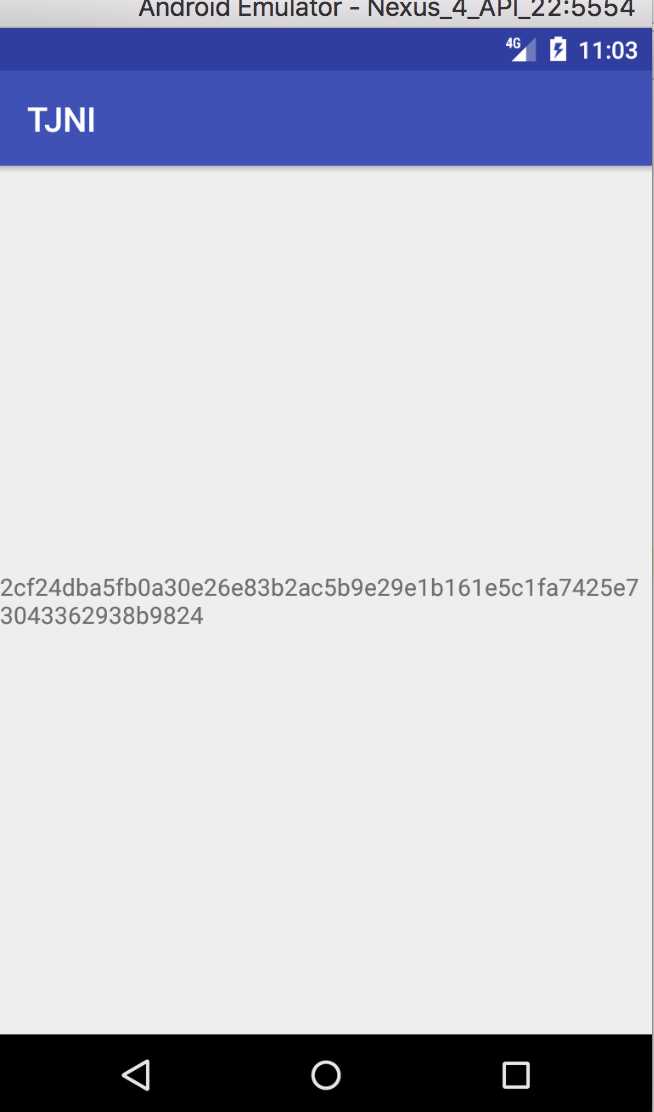
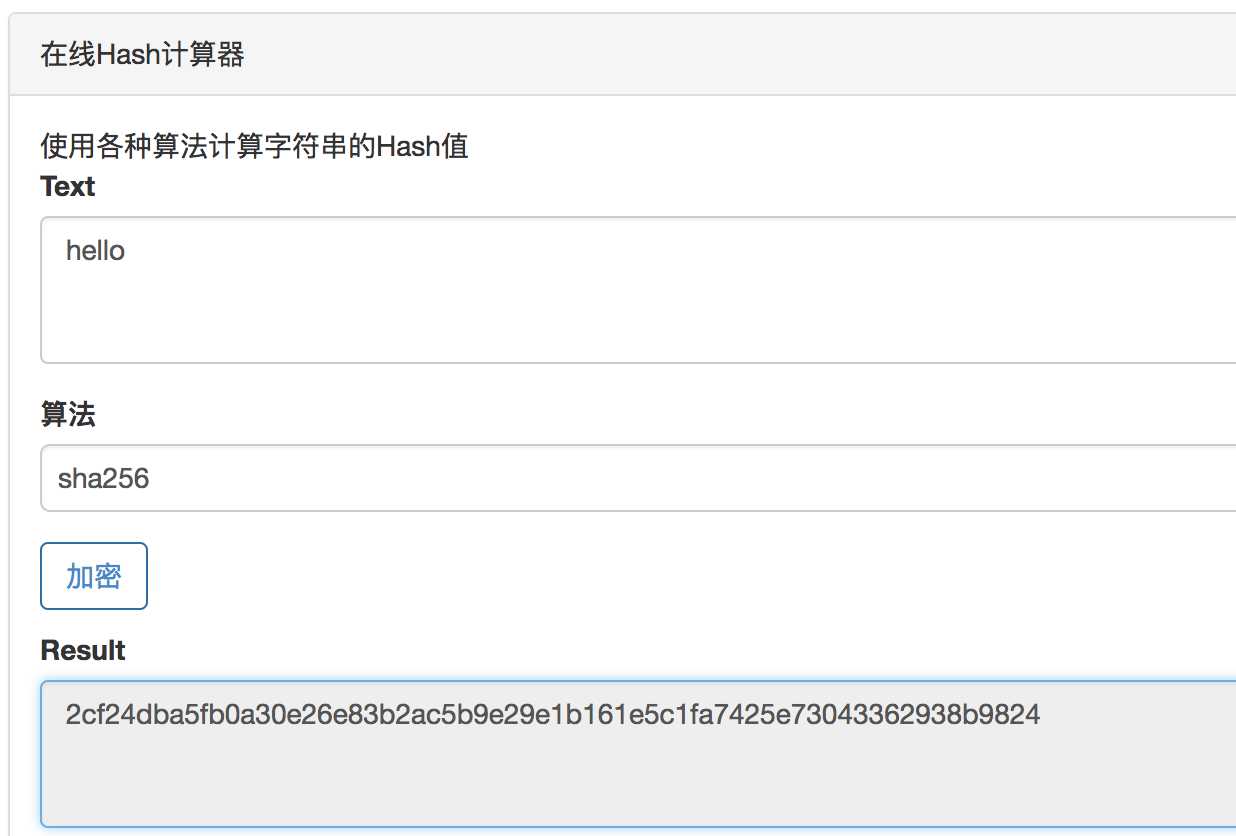
15: 参考资料与 工程下载
android ndk-build 编译静态库libxx.a 以及Android studio openssl 静态库配置(cmake)
标签:ted images default add 直接 sig string 定义 tip
原文地址:http://www.cnblogs.com/cocoajin/p/7427037.html